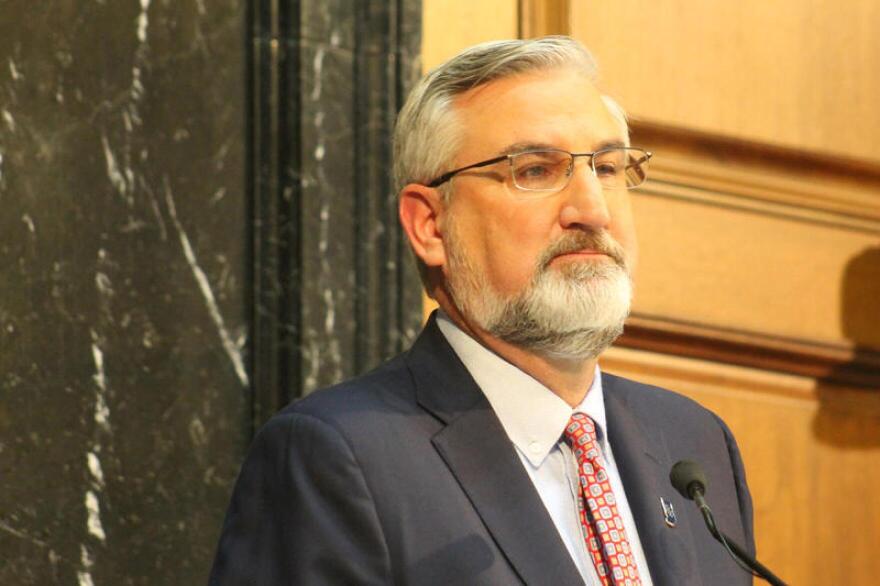Gov. Eric Holcomb vetoed House Bill 1041 late Monday. He said in his veto letter, the bill sent to him fell short of providing “clarity and one consistent state policy regarding the fairness in K-12 sports in Indiana.”
The bill faced pushback throughout this session from medical experts, student athletes, and LGBTQ+ Hoosiers and allies – with many pointing to the harm it would do to transgender children. National data shows high rates of suicidal ideation by LGBTQ+ – and especially transgender – youth. Some of which is attributed to legislative policies focused on their identity.
The bill would have created a statewide ban on transgender girls participating in girls school sports, and require school sports and teams be designated for a certain gender or as a mixed league. It also required schools to create a grievance process and it created an avenue for someone to file a lawsuit for violations of the parameters outlined in the bill.
Following the bill's approval, calls for Holcomb to veto the bill began circulating on social media – including from the ACLU, which had promised to file a lawsuit against the state should the bill become law.
Many people expected Holcomb, a Republican, to sign the legislation. Lawmakers approved it mostly along party lines this session, and Republicans have proposed similar bills in states across the country.
Katie Blair is the advocacy and public policy director for the ACLU of Indiana. She said it's a pleasant surprise – but Holcomb's decision acknowledges what other courts have already affirmed.
"That this language is unconstitutional and blatantly discriminatory, and it's been blocked by several courts around the nation," she said.
In his veto letter, Governor Holcomb said he had concerns about that process and the potential for unequal treatment from school district to school district.
“Meaning, student-athletes could be treated differently according to which school they attend and compete for. Frustration of students, parents and administrators will likely follow,” Holcomb said in his veto letter. “This of course only increases the likelihood of litigation against our schools with the courts having to adjudicate the uncertainties.”
Holcomb also raised concerns about the problem this bill attempted to solve. The bill's author, Rep. Michelle Davis (R-Whiteland) said the bill was about preserving fairness for girl athletes.
“[The bill] implies that the goals of consistency and fairness in competitive female sports are not currently being met. After thorough review, I find no evidence to support either claim even if I support the overall goal,” Holcomb said in his veto letter.
Join the conversation and sign up for the Indiana Two-Way. Text "Indiana" to 73224. Your comments and questions in response to our weekly text help us find the answers you need on statewide issues. Trying to follow along with our coverage of the legislative session? We've compiled all the stories our reporters have published by bill number and topic here.
Democrats and LGBTQ+ advocates rallied against the bill, and said it was part of nationwide efforts to pass similar legislation which are perpetuating "culture wars" that hurt kids.
They pointed to the bill's support from the Alliance Defending Freedom, a conservative Christian advocacy organization classified as a national hate group for its efforts targeting the LGBTQ+ community. The group has been involved with passing similar bills – and litigation around them – in states like Idaho and Montana.
Holcomb's letter also noted the outcomes of litigation in states where similar legislation passed.
“In the two cases with initial rulings thus far, the courts have enjoined or prohibited laws with these same substantive provisions from taking effect based on equal protections grounds,” Holcomb said in his veto letter.
Chris Paulsen is the CEO of Indiana Youth Group, a nonprofit for LGBTQ+ youth. She said Holcomb's veto letter echoes what opponents of the bill said during public hearings in the legislature – and pointed out he isn't the only Republican governor who has vetoed this type of legislation.
"I think people are starting to think more about these bills and how they harm people and the fact that they just don't help anyone," Paulsen said.
This is the seventh time the governor has used his veto power. The General Assembly can override vetoes with a simple majority in each chamber. Such a move could happen as soon as May.
This story has been updated.
Contact reporter Jeanie at jlindsa@iu.edu or follow her on Twitter at @jeanjeanielindz. Contact Lauren at lchapman@wfyi.org or follow her on Twitter at @laurenechapman_.
Copyright 2022 IPB News. To see more, visit . 9(MDAwMjUwMzQ2MDEyNjIyMDkxNjA1MzMzYw004))


